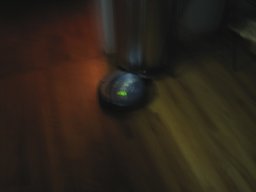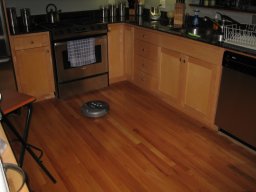| Home Page | ^ Weblog ^ | |
| << The S-Word | Hovercraft in Renton >> |
| [ printable ] | |
My First Robot
tomva buys a Roomba.The Big Day
Meet Scooter
Next Robots
Comments
The Big Day
[Tuesday, 22 August, 2006] Laziness is, as they say, the mother of invention. In particular, it was a Saturday and I didn't want to vacuum the house. So rather than take 30 minutes and clean the house, I spent a few hours researching and then shopping for my purchase.Meet Scooter
Finally, at 1:30pm at Costco, I bought Scooter . He's one of the iRobot Roomba line. August 19, 2006: the day I bought my first robot. In only a few years, robots will be everywhere. We'll have a hard time imagining the world before robots, like how it's hard to think back before cell phones or washing machines. Weird! Anyway, I was curious to see how Scooter would do. Of course, I didn't get to see anything on Saturday: after you buy a Roomba, you have to let them charge for a few hours. So my first task, after buying my vacuuming robot, was to vacuum the house using my trusty stand-up vacuum. But when I woke up on Sunday, Scooter was ready to go. Instead of a pulsing orange light, a steady green light indicated he was eager to do what he was designed to do. The house desperately needed vacuuming, since a few people had been over on Saturday night, and we'd gone through several bags of chips while eating barbeque. So I let Scooter go. |
Scooter in action. |
 |
Scooter in the kitchen. |
Next Robots
The Roomba is a great example of where robots will first become useful. Vacuuming a floor is a constrained task. It requires a surprising amount of computing power to do it autonomously, but it's within the range of today's processors. As AI improves, robots can be trusted with more and more around the house. But it will be a long time before we'll trust one to separate junk mail from real mail, for instance. Even so, there are some obvious spots where robots should be used right now, but aren't:- Car Washes This is a great use for robots. Go through an automatic car wash sometime. They are large, imperfect machines that spend a lot of soap and water and don't clean your car very well. Why not? Because they have to handle a wide range of car shapes and sizes, and do so imperfectly. A robot could handle this far, far better. It could clean cars meticulously and use less water doing it.
- Stoplights Even primitive image recognition could vastly improve existing stoplights. Especially at off-peak hours, stoplights could see oncoming traffic and change the lights so that most cars wouldn't have to stop. Even a slight improvement in efficiency would make for happier drivers, and save fuel consumption.
Comments
Loading comments...
Post a comment
WARNING: This is a very primitive comment posting. Stick to alphanumerics only! No quotes, brackets, etc.| Home Page | ^ Weblog ^ | |
| << The S-Word | Hovercraft in Renton >> |